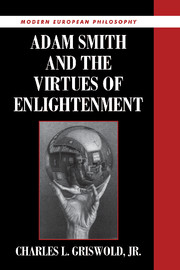Book contents
- Frontmatter
- Contents
- Texts and Acknowledgments
- Introduction
- 1 Rhetoric, Method, and System in The Theory of Moral Sentiments
- 2 Sympathy and Selfishness, Imagination and Self
- 3 The Passions, Pleasure, and the Impartial Spectator
- 4 Philosophy and Skepticism
- 5 The Theory of Virtue
- 6 Justice
- 7 The Moral Sentiments and The Wealth of Nations
- 8 Philosophy, Imagination, and the Fragility of Beauty: On Reconciliation with Nature
- Epilogue
- Bibliography
- Index
Epilogue
Published online by Cambridge University Press: 10 November 2009
- Frontmatter
- Contents
- Texts and Acknowledgments
- Introduction
- 1 Rhetoric, Method, and System in The Theory of Moral Sentiments
- 2 Sympathy and Selfishness, Imagination and Self
- 3 The Passions, Pleasure, and the Impartial Spectator
- 4 Philosophy and Skepticism
- 5 The Theory of Virtue
- 6 Justice
- 7 The Moral Sentiments and The Wealth of Nations
- 8 Philosophy, Imagination, and the Fragility of Beauty: On Reconciliation with Nature
- Epilogue
- Bibliography
- Index
Summary
[A man] must not expose himself to the charge which Avidius Cassius is said to have brought, perhaps unjustly, against Marcus Antoninus [Marcus Aurelius]; that while he employed himself in philosophical speculations, and contemplated the prosperity of the universe, he neglected that of the Roman empire. The most sublime speculation of the contemplative philosopher can scarce compensate the neglect of the smallest active duty.
Adam Smith, TMS VI.ii.3.6I began this book with a general discussion of the Enlightenment and of the widespread unease about its prospects and about its virtues. I suggested that Adam Smith is both a partisan and critic of the Enlightenment; he purposes to preserve what is best about the movement by drawing upon resources ancient and modern, while also analyzing its unintended shortcomings. I have argued throughout that the old problem of the relationship between philosophy and ordinary experience is itself fruitfully seen as a principal theme in his reflections on what it would mean for human life to be enlightened. At several junctures I queried the persuasiveness of the manner in which particular themes and arguments are treated in Smith's work – for example, the priority of the spectator over the actor in matters of ethical evaluation, the safeguards against the possible degeneration of the pleasure of sympathy into selfishness and vanity, the circularity of ethical reasoning, and the prescriptions for liberty of religious belief and their implications for the survival of energetic religion. On each occasion I sought to articulate Smith's likely reply to questions that might legitimately be put to him.
- Type
- Chapter
- Information
- Adam Smith and the Virtues of Enlightenment , pp. 355 - 376Publisher: Cambridge University PressPrint publication year: 1998



